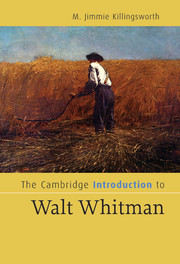Chapter 3 - Poetry before the Civil War
Published online by Cambridge University Press: 05 June 2012
Summary
American poetry underwent a profound shift with the publication of Leaves of Grass. It is only a slight exaggeration to say that, with this book, Walt Whitman changed the shape of poetry. He all but invented free verse in English, introducing breathlessly long lines and using repetition of words and sounds to create a web-like form to replace the conventional meters used by even the most experimental poets before him. He stretched the democratic poetics he inherited from Romanticism to new extremes, abandoning traditional diction while creating a style that mingled the language of everyday life with bold ventures into figural expression. He likewise embraced subject matter normally considered outside the scope of poetry, including “low” topics associated with the experience of the human body, sexuality, and the life of the streets. As a poetry of nature, Leaves of Grass served as a watershed for the main streams of Romantic and Transcendentalist writing and thought. But Whitman's book also embodied the struggles of a nation confronted with ethnic and class conflict, modernization, total war, urbanization, industrialization, and finally globalization.
This chapter deals with the poems composed for the first three editions of Leaves of Grass – 1855, 1856, and 1860. Whitman began the decade of the fifties with a burst of hopeful energy. Building on the spirit of the European Revolutions of 1848 and catching the fever of Jacksonian democracy and westward expansion, with its promise of nearly unlimited range for the development of the democratic way of life, the poet concocted an expansive theory of selfhood that informed and inspired the great cosmic/dramatic poems of 1855 and 1856, including “Song of Myself,” “The Sleepers,” and “Crossing Brooklyn Ferry.”
- Type
- Chapter
- Information
- The Cambridge Introduction to Walt Whitman , pp. 24 - 56Publisher: Cambridge University PressPrint publication year: 2007



